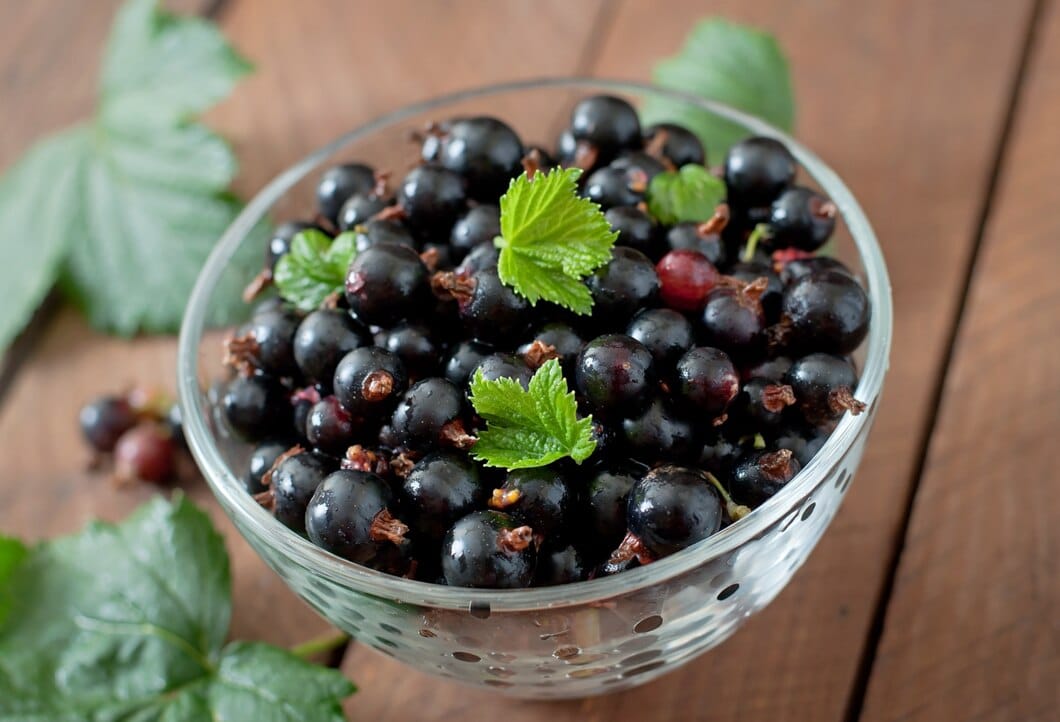Origin and history of Cassis
The blackcurrant, also known as the black currant, is a small black fruit from the blackcurrant bush, native to Europe and Asia. It is often confused with the blackcurrant berry, which is actually the fruit of the Ribes nigrum shrub, but has a more bitter taste. Blackcurrants have been highly prized since ancient times for their health benefits, and were introduced to North America in the 19th century.
Blackcurrants are grown mainly in France, Germany and Poland, where they are used to make liqueurs, jams and syrups. Its leaves and buds are also used in phytotherapy for their medicinal properties.
Composition of blackcurrant
Blackcurrants contain a wide range of health-promoting nutrients, including vitamins C, E and K, antioxidants, flavonoids, potassium, calcium and beta-carotene. Blackcurrant leaves and buds contain essential oils, tannins, phenolic acids and B vitamins.
Blackcurrant leaves are particularly rich in polyphenols, bioactive plant compounds with antioxidant and anti-inflammatory properties. They are responsible for many of blackcurrants' health benefits.
The benefits of blackcurrant
Blackcurrants are known for their many health benefits, including anti-inflammatory, antioxidant and anti-microbial action. Here are some of its most remarkable benefits.
- Boosts the immune system
- Powerful antioxidant
- Fights inflammation
- Improves cardiovascular health
- Stimulates digestion
- Maintains healthy joints
- Prevents eye problems
Blackcurrants are an important source of vitamin Cis an essential nutrient for a healthy immune system. Consuming it regularly can therefore help to strengthen the body's natural defences and prevent infections.
Blackcurrants are also rich in antioxidants, notably quercetin and anthocyanins, which help neutralise the free radicals responsible for premature ageing and certain chronic diseases.
The bioactive compounds found in blackcurrants, particularly polyphenols, have anti-inflammatory properties that can help relieve chronic pain and inflammation, such as that caused by autoimmune diseases like arthritis.
Blackcurrants can help maintain a healthy heart by reducing inflammation, regulating blood pressure and improving blood circulation. The anthocyanins present in blackcurrants may also help prevent the formation of blood clots and reduce the risk of heart disease.
Blackcurrant leaves have been used for centuries to relieve digestive disorders such as bloating, abdominal pain and diarrhoea. Its tannin content gives it astringent properties that can help regulate bowel movements and reduce irritation of the digestive tract.
Blackcurrant is widely used in food supplements to relieve joint pain and the symptoms of osteoarthritis. Its anti-inflammatory properties can help reduce swelling and pain, while quercetin helps strengthen cartilage.
Thanks to its high antioxidant content, particularly lutein and zeaxanthin, blackcurrants can help prevent age-related eye diseases such as cataracts and macular degeneration.
Use as a food supplement
Blackcurrant is often consumed as a dietary supplement, particularly in capsules or dried leaf powder. It can also be consumed in juice, syrup or jam.
To reap the benefits of blackcurrant, it is advisable to follow a strict diet. food supplement cure blackcurrant leaves or buds for a period of 3 to 4 weeks. Dosages may vary according to brand and product, so it is important to follow the manufacturer's instructions.
It is important to note that blackcurrant-based supplements should not be used to replace a balanced diet and healthy lifestyle. They complement a healthy lifestyle to strengthen the body's defences, relieve certain symptoms and improve general well-being.
Contraindications and precautions for use
Although blackcurrant is generally considered safe to consume, it is important to note that it can interact with certain medications, particularly anticoagulants and anti-diabetic drugs. It is therefore important to consult a health professional before starting a course of blackcurrant-based food supplements.
Pregnant or breast-feeding women should also avoid blackcurrant-based products, as their effect on pregnancy and breast-feeding has not been sufficiently studied.
If you are allergic to birch pollen, it is also advisable not to take blackcurrant-based food supplements, as it can cause a cross-allergic reaction.
Finally, it is advisable to follow the recommended doses and not to exceed the 4-week consecutive course of treatment.
Conclusion
Blackcurrants are a fruit rich in nutrients and bioactive compounds, with numerous health benefits. Whether it's for boosting the immune system, relieving joint pain or improving cardiovascular health, blackcurrants are a valuable natural ally.
However, it is important to take precautions and consult a health professional before starting a course of blackcurrant-based food supplements. By following these recommendations, blackcurrants can be incorporated into a healthy, balanced diet for better overall health.
Sources :










